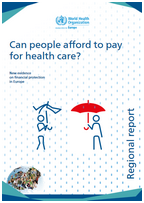Universal Health Coverage, Gender Equality & Social Protection: A Health Systems Approach
Извор: WUNRN – 21.09.2019

Authors: Gita Sen, Veloshnee Govender and Salma El-Gamal – Publisher: UN Women – Date: December, 2018
This paper is one of two background papers commissioned by UN Women for CSW 63 (March, 2019) on “Social Protection Systems, Access to Public Services and Sustainable Infrastructure for Gender Equality and the Empowerment of Women and Girls”. Universal Health Coverage (UHC) is a key component of social protection as defined by the ILO. Based on an analysis of country experiences, the paper asks whether UHC policies have led to reduced gender inequalities. Examples are given of UHC reforms that have paid explicit attention to gender and inequalities in design and implementation.
Different multilateral agencies have used varying definitions of social protection, not all of which emphasize it as a right. While it is generally agreed that effective social protection is necessary to manage risk and vulnerability, there is often disagreement about the causes of that vulnerability and who is responsible for tackling it, and differing emphasis in the attention paid to human rights. This has implications for UHC program direction, quality and effectiveness, and directly and indirectly for gender equality and women’s human rights, as the cases in this paper show.
The traditional approach to UHC suffers from at least three inadequacies. First, it does not take into account interdependencies among people, services and financing mechanisms. Second, it does not address all of the health system building blocks defined by the World Health Organization: financing and service provision, but also health service norms, human resources for health, access to medicines and medical devices, management and institutional reforms, and community participation. And third, it lacks a multi-dimensional approach anchored in human rights and solidarity.
For groups at the bottom of the socioeconomic order, only focusing on economic barriers to access is not sufficient. Other forms of subordination and disadvantage such as ethnicity, gender, disability, widowhood, or caste among others can be barriers that call for sustained and focused policy attention. By arguing for attention to the specific needs and disadvantages of particularly deprived and subordinated groups, the paper insists on the importance of recognizing social factors and power relations that go deeper than household poverty alone. Without this attention, such groups tend to be excluded and marginalized, and their needs and circumstances ignored or distorted. Our approach ensures that the universalism built into UHC is truly universal, not only along a single dimension.
A rights-based approach combined with social acceptance of solidarity as a rationale for public action, provides the strongest and most sustainable basis for public provisioning that can ensure UHC (and indeed all social protection), and provide an ethical and durable framework for program choices and decisions. In particular, the approach of solidarity may allow UHC policies to break through the existing fierce debate about the relative merits of targeting versus universalism. From the perspective of gender equality, a human rights-based approach is essential to move beyond the limitations of a narrowly technicist view of Universal Health Coverage.



